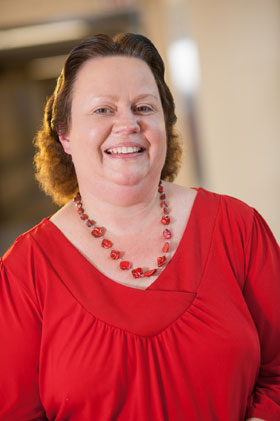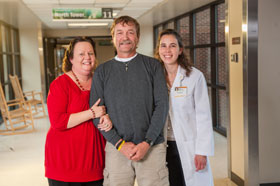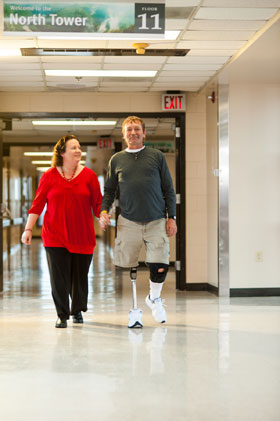Renee's Story

Halloween evening in 2011 my life was changed forever. I was home giving out candy to trick-or-treaters when my phone rang. On the other end was a lady informing me that my husband had just been involved in an accident. I knew it couldn’t be good as he was on a motorcycle. She said she was a nurse and had stopped to help. She said he was conscious but she thought his leg might be broken. She said the ambulance was in sight and for me to meet him at the hospital and she said one more thing, “He told me to tell you he loves you.” Why did he have her relay that message to me? Was he not expecting to tell me again himself?
After I arrive at the local hospital, a nurse comes out and advises me that the helicopter is almost there. I ask, “What helicopter and why is a helicopter needed for a broken leg?” I then realize things are much worse than a broken leg.
My husband was airlifted to the medical center at Wake Forest Baptist Health where he underwent two surgeries to amputate his right leg (above the knee) and his left leg was repaired with plates, screws and rods. Dr. Anna Miller (his orthopedic surgeon) and the entire trauma team at Wake Forest Baptist Health did a fabulous job of putting him back together and saving his life. He had to be given a total of 18 pints of blood. He was released to go home a week later. He couldn’t start any type of physical therapy because he was non-weight bearing.
My husband spent the next three months in a hospital bed in our living room (our bedroom wasn’t an option as it was upstairs). I had no medical background and had no desire for any as I don’t handle medical situations well. I spent the next several months sleeping on the couch so I could take care of my husband. It was very hard holding down a full-time job, taking care of his medical needs, keeping up with all his appointments and being sure he got to his appointments.
We had a lot to deal with, but decided to make lemonade out of lemons. Having a bad attitude wouldn’t change things and would actually be detrimental to us and our mental well-being. We tried to keep a positive attitude, rely on our faith, and just be thankful that he was still alive.

We had lots of family and friends that offered to help. Our son and his wife helped in so many ways. Our daughter-in-law offered to give my husband the two shots of Lovenox (blood thinner) he required every day as I have an aversion to needles and didn’t feel that I could administer the shots. She faithfully showed up every 12 hours (this medicine must be promptly given at 12 hour intervals) to give him the shots for almost two months after his accident.
I learned a lot during our journey of my husband’s recovery. A few suggestions that I would give to other families going through similar circumstances would be to write everything down and educate yourself.
I found it helpful to keep a notebook and make notes of things the doctors and nurses told me. I would note questions I had for the doctors so when they came around I would remember to ask them and express my concerns. I later kept all his doctors’ information, phone numbers, and appointments in a notebook. Two and half years later and I still use this same notebook. I have all of his medical history available in one area when asked a question by a doctor, his previous procedures, a list of his current medicines, etc.
My other advice for family members of a trauma patient is to educate yourself on your family member’s injuries. If you do your research, you will know what questions to ask for your loved one. The best decision I made on my husband’s behalf was the person (Tony Saia at Bio-Tech) we chose to see for his prosthetic needs. Had I not educated myself on prosthetics (I knew absolutely nothing about prosthetics before his accident), I could have made a bad choice for the most important part of his recovery.
The worst decision I made for my husband during his accident and recovery was my choice for his rehabilitation. Had I researched this area and educated myself, I would have made a different choice. I didn’t realize that his insurance company (as many do the same) only allows a certain number of physical therapy visits per year. I should have saved his physical therapy visits for after he received his prosthesis and should have chosen a physical therapy program that deals with prosthesis (not a local option).

Even though I had a background in the legal field and in the insurance field, I was forced to learn more about health insurance than I cared to know. I kept up with all his bills, explanation of benefits from the insurance company, learned to look up his information online through his insurance company, made several phone calls on his behalf, and learned how to file appeals with his insurance company when they didn’t want to pay certain bills or cover certain items. I found that perseverance and self-education go a long way when dealing with matters related to your loved one’s recovery.
Recovery is not an easy road, but it did make us better people. We are more understanding of others’ needs. My husband volunteers each week at Wake Forest Baptist Health through the Trauma Survivors Network program. He thoroughly enjoys talking with other families and patients as he knows first hand what trauma is and the effects of it. He looks forward to volunteering and it truly helps him.
I attend the monthly Trauma Survivors Network support group meetings with my husband. I find the meetings beneficial and enjoy talking with other survivors. We are both grateful that Dr. Miller referred us to this gratifying program.